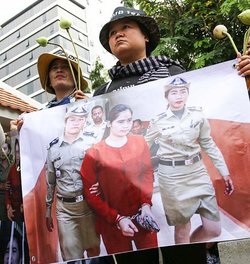“I became victimised because my land was grabbed, and now I’ve been put in prison.”

There were dramatic scenes outside a Phnom Penh court this week as one of Cambodia’s most iconic activists lost an appeal to overturn her 2½-year jail sentence. Dressed in an orange prison uniform Tep Vanny left shouting, “I became victimised because my land was grabbed, and now I’ve been put in prison,” according to media reports, as security guards bundled her into a van.
At a time when Cambodian Prime Minister Hun Sen is proactively courting investors from overseas, we need to be holding a microphone to Tep Vanny’s story. This is a woman who was beaten and arrested multiple times because she dared to speak out when her home was taken from her. She is one of around 830,000 victims of land grabbing in Cambodia, as the government works with state security forces to seize people’s land, and parcel it out to companies.
The crime pinned to Tep Vanny relates to a 2013 protest she helped organise outside Prime Minister Hun Sen's Phnom Penh mansion. She and dozens of others were demanding justice for the victims of a huge land grab in the capital city, which has seen more than 4000 families forced from their homes. Tep Vanny was sent to prison for attacking security forces.
She claims however that it was the guards who beat demonstrators, all of whom were women.
Before her activism thrust her into the spotlight Tep Vanny was a housewife. She and around 20,000 others lived on the edges of Boeung Kak, formerly a sprawling lake where Phnom Penh tourists would flock to see the famed sunsets. In 2007 the government leased the lake to a Cambodian tycoon and a Chinese company to transform it into luxury apartments, hotels and shopping malls.
To drain the lake, tonne upon tonne of mud and sand were pumped into the lake, flooding the homes of hundreds of residents. "They started pumping the water and sand in at night," Tep Vanny told the Guardian, "while we were sleeping."
In the years that followed riot police were frequently deployed to Boeung Kak to quell protests.
Evictions like these are happening across continents, all the time. As industries like mining, agribusiness, logging and hydropower go in search of new land, those who live on it are forced out. Land grabbing has reached crisis levels across much of Southeast Asia and Latin America, and is becoming increasingly violent. As our research shows, year-on-year more of those who take a stand are being killed.
In Cambodia land grabbing has happened at such scale and so systematically that the International Criminal Court (ICC) Prosecutor is considering investigating it as a crime against humanity.
Many of the projects that have pushed Cambodians off their land can be traced back to the ruling family and their network of cronies. Shukaku, the Cambodian company at the heart of the Boeung Kak crisis, is owned by Senator Lao Meng Khin of the ruling party, a close friend of the prime minister’s. He and his wife also run Pheapimex, arguably Cambodia’s most powerful company, which controls over 7% of Cambodia’s total land area.
Cambodia has experienced rapid economic growth for the past two decades and increasing numbers of foreign companies and investors have flocked to enter the market, enticed in part by the country’s minimal regulatory red tape.
Stories like Tep Vanny’s are the flip side of that perk. While those lucky enough to have bought or been born into privilege are making a killing, Cambodia’s economic ascent is in many ways further entrenching the desperate poverty that much of the population suffers.
Foreign investors would be wise to take their money elsewhere, to avoid bankrolling the sorts of corruption and human rights atrocities that have driven hundreds of thousands of people from their homes, often violently.











